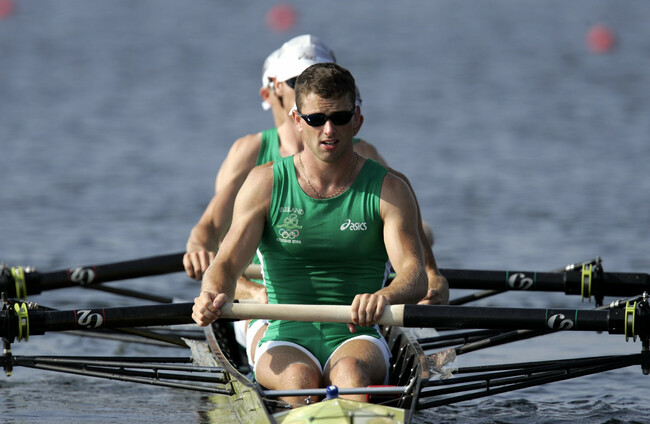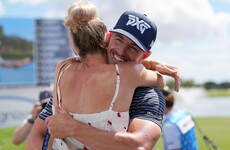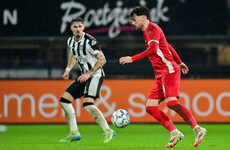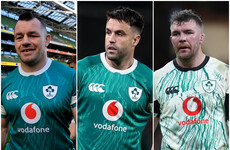BECOMING AN OLYMPIC rower is an exercise in solemn transaction.
The investment is a great deal of work and self-deprivation, and the yield is performance and result.
“All these guys racing in Tokyo are hard-working, diligent and disciplined people who are showing up day-in, day-out, driving their cars down to the boat when its dark in the morning”, says Paul Griffin. “They are out in the snow, they are out in the hail, and they have been doing it day-in and day-out for years.
“That explains why you would be doing all of this hard work in the winter, by yourself, three years out from an Olympics. I believe in compounding: you put it into the bank and it will yield results in four years’ time. Every little thing makes a difference.
“There’s a fantastic purity about that life, there’s a brilliant truth in it. It is so honest.”
Griffin himself gritted his teeth, doused any doubts in something stickier, and spent it all.
In return, he was part of a lightweight men’s four that represented Ireland at the 2004 Olympics in Athens and again in Beijing four years later.
Paul Griffin: Two-time Olympian.
What does that title mean to him now?
“It means the journey I had to undertake to get there”, he tells The42.
Griffin was among the rare breed of sportsperson: a Kerryman with no great talent for Gaelic football.
Instead he discovered rowing at 13 and never let it out of his sight. He began rowing for Fossa and helped them win their first-ever national Junior championship before then moving to Muckross to win further national honours. In 1996 he was picked as one of four to represent Ireland at the home internationals in Scotland, won gold, and the Olympics became real on the journey home with chatter around him focused on the Irish lightweight fours side rowing later that day in an Olympic final. (They were pipped to a bronze medal by the Americans.)
Griffin pinned an Olympic flag to his bedroom wall and went full-time in 2001, with Athens ’04 in view.
Living at home with his parents, he didn’t have a car, meaning winter’s depth was spent cycling to Muckross Community Centre for an hour-long session on the rowing machine, followed by a cycle back to fit in some rest and an afternoon run before cycling to a punishing evening weights session.
Griffin also had to work harder than the rest to find power to mitigate against his height disadvantage: at 5′ 9″ he was six inches short of the average height of an Olympic rower.
And he did it all of this in near-obscurity. The Olympics may be the biggest show on earth but the Olympian’s soul is more remote, forged in a harsh and unforgiving solitude. The anonymity didn’t matter to him, and he remembers regularly cycling home from his evening sessions training past a local pub thronged with local Gaelic footballers stopping off after their own training, perversely enjoying the fact his feats were off-radar. “There was”, he says, “a certain kind of satisfaction in that.”
He remembers a story told by Niall O’Toole, who was a world champion in the single sculls in 1991 and represented Ireland at the Barcelona, Atlanta, and Athens Games.
“He said there were more bad days than good. He was in Blessington one day in the middle of winter, he was sick, and he was out near the dam somewhere, there was nobody within miles of him.
“And he was just roaring at himself. Screaming.
“It’s an indicator of how true his motivations were. There was no limelight, no glamour. It resonated with me. There’s a huge hill run here in Killarney that I used to do religiously, it’s about 35 minutes from the bottom to the top. I was up there once, really struggling – possibly sick – and near the top and with nobody around for miles, I was doing the same thing. Just roaring at myself.
“Rowers are that way. We understand that it’s like the iceberg: there’s so much under the water you don’t see. That’s where the work goes on. You just see the top above the water once every four years.”
But then again the most important conversations are not those others are having about you, but the ones you are having with yourself.
“You cut a deal with yourself”, says Griffin of the more brutal aspect of the work. “‘I will do this, I know it will be bad at the end, but I will recover.”
Sometimes, says Griffin, it was better not to have them at all, quoting a line from Sean Kelly’s autobiography. Kelly would get out of bed, get into his cycling gear and leave before he checked the weather through the window, for fear the rain would be sufficiently crooked to tempt him into staying at home.
The sum total of Griffin’s effort hit home with him in 2005, when he was among a team of Irish rowers stood before new national coach Harald Jahrling. “He told us that to become an Olympic medalist, we had to become one of ‘the toughest people on the planet.’”
At the elite end of the sport, Griffin explains, the gains are to be found less in technique than in raw, physical power. And the rower’s opponent is less the boats to their left and right than their own capacity to endure pain.
“The battle is against yourself”, says Griffin.
“Sports scientists will say rowing is mad as you do the absolute worst thing possible in going off as hard as you can. But everybody else does it, so you have to do it. So you go off absolutely flat out.”
Griffin accentuates the physical demand in terms of lactate acid, which builds up when the body needs oxygen. Within a minute of an Olympic-standard 2km race, Griffin says the rower will be at readings of up to 15 or 16 mmol. For context, that’s roughly four times what a professional marathon runner would reach.
“Then you have to sustain that for the next five-and-a-half minutes”, continues Griffin.”It’s hard to think. You can’t talk. We rehearsed one and two-syllable calls which would mean a lot, as that’s all you would be able to get out.
“And you empty the tank. If it’s a race that means something, then you fight tooth and nail for it.”
It’s generally accepted, he says, that a rower will need 15 minutes to have the energy to stand up at the end of a race, but he can remember a 2002 test on the machine which left him unable to walk for an hour afterwards.
Griffin nonetheless fought his way to Athens, and made it the Olympic final in the lightweight fours with Richard Archibald, Eugene Coakley, and Niall O’Toole. They finished sixth.
“In terms of an experience, Athens was a little bit of a disappointment”, reflects Griffin. “We would have liked to get a medal there. We were 24 and so we were quite young, but we felt our time was then.” He didn’t stick around for the closing ceremony and flew home early, arriving without a medal nor any lingering hunger for the sport.
He brought the Olympic flag from his bedroom with him to Athens, but 18 months after the Games, it was still sitting in the bag.
Slowly the old fire kindled again, however, and Griffin went back for more. A new coach arrived in Harald Jahrling, two of his team-mates from Athens were willing to ride again, and many of the teams that had beaten his Irish team at Athens had retired. All coalesced into the tantalising vision of a medal in Beijing.
Griffin was part of an Irish boat that won World Championship silver in 2005, and bronze the following year.
“I wasn’t interested in going to Beijing to have a look around. That sounds a bit mad, maybe, and for some people, their pinnacle or their podium is to go to the Olympics.”
The medal didn’t happen. This time, a final didn’t happen either: Griffin and his team-mates finished sixth and last in their semi-final. “Our crew didn’t pull together, for want of a better phrase. We had a group of six or seven people and they were at different stages of their lives and their careers, and the timing wasn’t there. Some people were pretty burnt out by then, and I was really finished with it at that stage.”
But not fully finished with the Olympics. As part of preparation for Beijing, Jahrling had brought the rowers on a pair of cross-country skiing camps, given the similarities in necessary endurance. Griffin excelled, to the point he threw himself into qualifying for the event at the 2010 Winter Olympics in Vancouver.
Aiming to become only the third athlete to ever represent Ireland in both the summer and winter Games, Griffin gathered the qualification points he needed, but was overlooked for selection in favour of a Scottish athlete who missed out on the Team GB qualifying standard but decided to find another route by invoking his right to an Irish passport.
“At the time, I was really annoyed about it”, says Griffin. “I will hold my hands up and say he had the better average points, and on that objective basis he was better. And if we had a race in February of 2010, he would have been faster. But I felt I was improving all the time, given I was just getting going.
“In hindsight, looking at the results, I’m happy enough I didn’t race there. I would have been absolutely horizoned. In Vancouver they switched the format around, which meant the slowest guys were on the worst snow and choppiest conditions, which would have been to my disadvantage as my ability to go around bends at 50km an hour on a two-inch wide ski wasn’t as well developed as the others.
“I had the endurance and the engine, my biggest problem was the technique. I didn’t grow up skiing in Kerry.”
And so that was it for Paul Griffin and the Olympic Games.
He and former team-mate Timmy Harnedy did toy with the idea of doing it all over again one last time for the 2016 Rio Olympics, ultimately deciding against it when it was clear the O’Donovan brothers would concentrate on the lightweight double sculls.
He says the Irish team we will see on the Tokyo waters are world class. “Sanita [Puspure] has a real chance. She is very experienced, but it’s a tough event and she would be following in the footsteps of real legends in rowing. I would really love to see her win, that would be special.”
Griffin is now a fully-fledged member of what he calls the real world, living in Killarney, married with three kids under the age of five, and working in tax.
He still rows as often as he can with Muckross, and has taken to representing the club at Masters level – rowing being rowing, anyone thirty or over is eligible – but nowadays his life is more about keeping everything on course rather than sprinting to the finishing line.
“I don’t have any regrets. I don’t have any hardware to show for two Olympics, but I have two World Championship medals. We were world class for a period of my life where we got good results, and there have been world class guys who came away from rowing with no medals.
“The journey was also really important. I look back at it now with the best of memories. Time has obviously changed my perspective to some degree, but I think it changed it for the better. When you go into the real world and you have to work and do the normal things that normal people do, you realise how good and simple and pure that life is.
“You’re a full-time athlete and there are very few variables in your life. You can put in all this work and you will get it back out. That was a great existence.
“Plus, I got a chance to wake up on a Sunday Morning, 15 August 2004, and say, ‘This is the morning of the Olympic final, and here I am. This is me, Paul Griffin from Killarney.
“And here I am.”













Unreal commitment to be an Olympian. Congrats Paul on your brilliant achievements
Really nice read, and how proud you must feel. Well done and I hope other life’s endeavours bring you as much contentment
Incredible story of pure determination. Unbelievable self motivation and grit to get up and train like that day after day.
I don’t know how elite athletes do it fair play
Paul was an amazing athlete – I think the pace of the four in 2005 and 2006 was the fastest lightweight 4- we’d ever had and such a shame the project ran out of steam by 2008